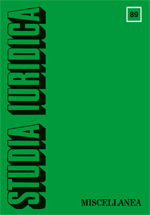Zasada nemo plus iuris in alium transferre potest a dobra wiara nabywcy autorskich praw majątkowych
The nemo plus iuris in alium transferre potest principle and the good faith of the purchaser of author’s economic rights
Author(s): Beata GiesenSubject(s): Law, Constitution, Jurisprudence
Published by: Wydawnictwa Uniwersytetu Warszawskiego
Keywords: acquisition of author’s economic rights from an unauthorized person; good faith of a purchaser of author’s economic rights; nemo plus iuris principle in the field of copyright
Summary/Abstract: Contractual transfer of author’s economic rights will be effective only when the transferor was authorized to dispose of such rights. Acquiring a right from a person who is not authorized to alienate it is not known to copyright law. In this respect, the Roman principle of Nemo plus iuris in alium transferre potest quam ipse habet is fully applied, which entails a number of consequences. One of such consequences is the uncertainty as to the dispositive effect of an agreement obligating to transfer such rights, which in the era of mass trading in author’s economic rights may lead to significant distortions. Therefore, some proposals are formulated in the literature to protect good faith purchasers. For instance, it is suggested that Art. 169 of the Polish Civil Code may be applied to intangible property rights. Verifying the legitimacy of such a proposal requires the examination of legislative motives behind the solution adopted in the regulation mentioned above and the assessment of those motives from the perspective of the copyright law principles. What is of crucial importance here is to answer the question about the role of the possession of a thing for the legal substantiation of good faith acquisition from an unauthorized person. Rejection of the theory which derives the legitimacy of the person disposing of the right from the very fact of them possessing the thing in fact opens way to consider whether it is possible to adopt a similar solution in the copyright law. The author’s monopoly is completely independent from the possession of the object in which the work is possibly embodied. Therefore, is it dogmatically legitimate to apply Art. 169 of the Civil Code to a purchaser of author’s economic rights? The article attempts to answer this question.
Journal: Studia Iuridica
- Issue Year: 2021
- Issue No: 89
- Page Range: 88-110
- Page Count: 23
- Language: Polish

